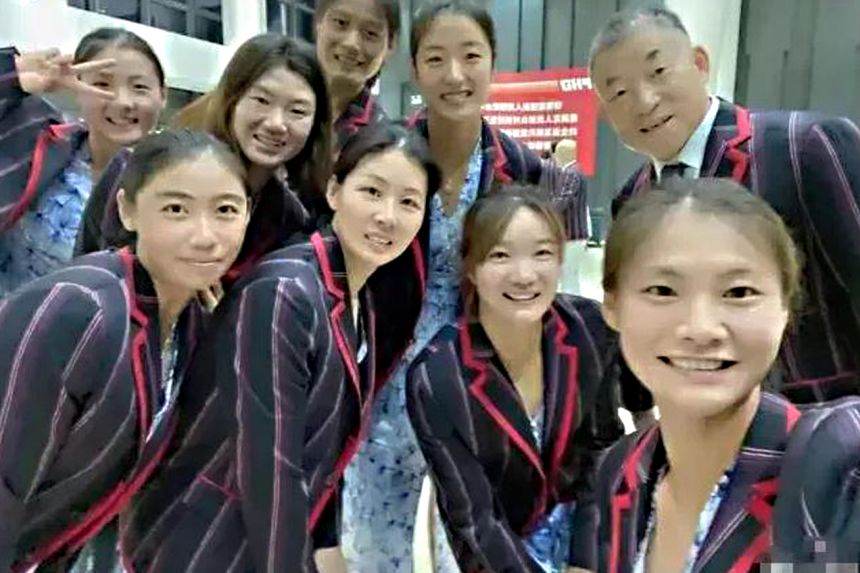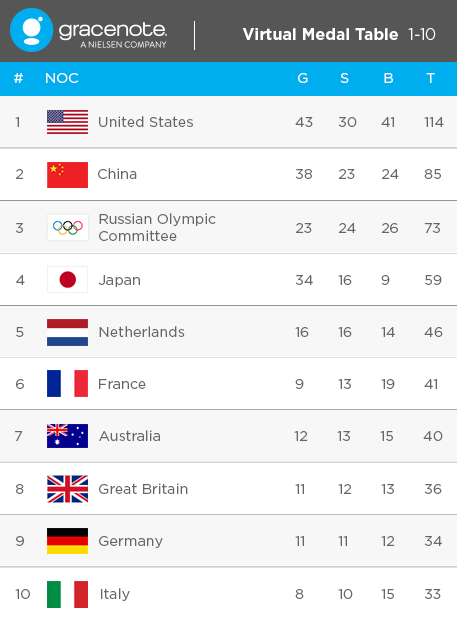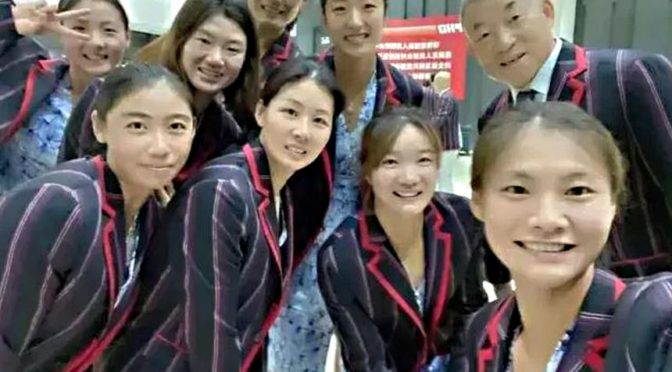In this week’s Olympic round-up:
- IOC President calls Japanese people “Chinese”
- China’s largest ever delegation to “go all out”, as uniforms ridiculed
- COVID fears hamper Team China build-up in Tokyo
- China predicted to finish second in medal table
- Beijing 2022 preparations “on track”, but outlook remains uncertain
- The latest Beijing Olympics boycott talk
- All the other features and stories of interest
Bach Calls Japanese People “Chinese”
IOC President Thomas Bach is lurching from one disaster to another. Fresh from referring to the Japanese people as Chinese (before swiftly correcting himself), he then headed over to Hiroshima, where he was “welcomed” by protests. He said this week that Tokyo is “the best-prepared Olympic city ever”, but with only 18.5% of Japanese fully vaccinated, it certainly doesn’t feel that way.
COVID-19 cases in Tokyo are near a six-month high and we’ve already had reports of the first positive test from inside the Olympic village. In fairness, the organizers have faced truly unprecedented challenges, but leaked conversations with sponsors from earlier this month provide some pretty extraordinary context. Here’s an extract:
Because the committee hadn’t imagined spectatorless games, they hadn’t decided on a plan for ticket refunds. Although the sponsors asked numerous questions at the July 9 meeting, the committee was unable to answer the majority of them. “This means that you, the sponsors, will experience some problems with tickets. Unfortunately, we haven’t yet ironed out the details for necessary next steps.”
In other words: “Sorry sponsors, you can’t do any of the things we’d promised you could do just weeks ago, but, make sure you pay us on time, ok?”
China’s Largest Ever Delegation To “Go All Out”
China is sending a record delegation of 777 people to the Tokyo Olympics, which consists of 431 athletes, plus coaches, officials and medical staff. News reports have also proudly announced that 99.61% of the delegation – or 774 out of 777 – have been vaccinated, which immediately made me wonder which three have not received a shot. My guess is that it’s foreign coaches opting to wait for a different vaccine, or perhaps a handful of people whose doctors have advised them not to get vaccinated due to certain medical conditions, but if you have any better ideas, please suggest them in the comments below!
Women are said to hold up half the sky in China, but when it comes to the Olympics, it’s more like two-thirds. Of the 431 athletes, an impressive 298 (69%) are women, with just 131 (31%) men – and no Sun Yang, of course. The youngest athlete is diver 14-year-old Quan Hongchan while the oldest is 52-year-old equestrian competitor Li Zhenqiang. I saw a clip of teenager Quan on CCTV this morning and she looked and sounded more like a 10-year-old. Still, she won’t be the youngest athlete in Tokyo – that’s 13-year-old British skateboarder Sky Brown. There’s a good chance both will win medals, too.
Chinese sports minister and chef de mission Gou Zhongwen has asked the athletes to “go all out” and to “keep China in the leading group”. Gou, whose official title is the Director of China’s State General Administration of Sport, also called for athletes “to fight for the glory of their country with pride, honor and responsibility to achieve their goals in Tokyo and ensure that China stay in the top part of both the gold medal tally and overall medals table”. The “top part” may be slightly humble, as I discuss a little further below.
Meanwhile, Vice Premier Sun Chunlan – who is tipped to represent China at the Opening Ceremony next Friday – stayed on message, calling for the country’s elite athletes to “strive for athletic excellence and show good sportsmanship”. Like Gou, she also encouraged the athletes to “go all out on the Olympic arena and win glory for the nation”.
Finally, Liu Guoyong, secretary general of the Chinese delegation, has given the Chinese delegation two goals: win more golds than last time and stay COVID-free. “The total number of golds of the Chinese delegation in each Olympics has declined since 2008, and we want to stop this trend in Tokyo,” said Liu, who is also vice president of the Chinese Olympic Committee. “We also need to ensure zero COVID-19 infections in our delegation during the whole Olympics, and we will follow all the rules required by the Tokyo Olympic organizing committee,” Liu added.

COVID Fears Hamper Preparations for Team China
China’s first athletes to arrive in Japan for the Tokyo Olympics have already complained that poor prevention measures at their hotel will increase the risk of catching COVID-19. Fans have been banned from all venues in Tokyo, but a few outlying areas are allowed to have a limited number of domestic fans. China’s sailing team arrived this week in Enoshima, a small island where the sailing events will take place, and complained of insufficient precautions at their hotel, with fears among Team China about catching COVID from their new neighbors.
“The Chinese team lives on one floor, but mixing with tourists in the hotel is certainly a hidden danger,” said Zhang Xiaodong, head of the Chinese Sailing Association. “We are consulting with the Organizing Committee on this issue.”
Meanwhile, the table tennis has also been struggling with team boss Liu Guoliang saying COVID-19 safety rules are making life “extremely difficult” as his team looks to sweep the golds once again. “We didn’t expect some epidemic rules like not wiping the game table with your hand, or blowing (on the ball),” he told state broadcaster CCTV. “The preparation for this Olympic Games is actually extremely difficult.”
China have won 28 of the 32 table tennis titles awarded at the Olympics, with South Korean Ryu Seung-Min, who won the 2004 men’s singles title, the last non-Chinese athlete to win gold.
China Predicted to Finish 2nd in Improved Performance
Team China finished third in the gold medals table and second in terms of overall number of medals at the 2016 Rio Games with 26 golds, 18 silvers and 26 bronzes. In fact, China has finished in the top three positions overall every time since the 2000 Sydney Olympics, so finishing in the “top part” (see above) shouldn’t be too hard.
The expert forecasters at Gracenote Sports are predicting China to win 15 more total medals than they did in 2016 for a solid second place, but still behind the USA.

Here’s the skinny on China:
(Tokyo 2020: 85 medals, 2016: 70 medals)
China’s total of 70 medals in 2016 was the country’s lowest return since 2004 and the current Gracenote projection expects big improvement on this at Tokyo 2020. China edged Great Britain into second place in Rio by a margin of three medals. This time, host nation Japan and Russia were expected to be serious challengers to China for second place. But the data suggests that China will probably be further ahead in 2020 than they were in 2016. The number of medals forecast for China has increased by four since our first prediction was released in July 2019. The Chinese team is forecast to win medals in 23 different sports, its second largest number of medal winning sports, beaten only by the 26 in 2008.
As might be expected, Gracenote says this projection contains more uncertainty than usual because of the pandemic, and the lack of available information and competition results on which to base their predictions, so bear that in mind.
Beijing 2022 Preparations “On Track”, but Outlook Remains Uncertain
Back in China, journalists were taken on a tour this week of snow event venues in Zhangjiakou, which will host the ski jumping, snowboarding and Nordic events at the 2022 Winter Olympics.
While it’s clear that Beijing wants to show that preparations are on track and that the country has the virus under control, we’re all still guessing what rules will be in place for athletes, officials and coaches next February – or even whether spectators will be allowed to attend.
Here’s what Jia Maoting, general manager of the company overseeing construction of the venues, had to say to reporters:
The pandemic situation is uncertain, we cannot guess how it will develop. We have solid determination to face the changing world. We built good venues in any case and then we wait and expect a good result.
Jia was not exactly giving too much away there. Beijing is clearly waiting to see how things pan out in Japan with respect to the virus and related restrictions, but with the announced cancellation this week of the World Rowing Championships – set for Shanghai in October – there is yet another sign that China simply won’t take any chances whatsoever.
Smaller scale sports events could provide something of a dry run as to how things will be managed for the Olympics, but that doesn’t appear to be the plan. As one sports exec told me this week:
I fear that China’s zero case policy will backfire in the long term. I don’t see COVID-19 disappearing soon, so I wonder what the plan for the future is. It’s scary if you consider all the money that already went into these projects [such as the World Rowing Championships] and then they just let it die because there is no flexibility in how they deal with quarantine.
It’s a valid point, but one that is currently falling on deaf ears here in China. A photo of Chinese air hostesses arriving into the Netherlands this week wearing full PPE gear while locals don’t even wear masks in the supermarkets shows that parallel COVID worlds are developing. The BioNTech vaccine is set to arrive in China soon, reportedly to be used as a booster shot for those who have already had a Chinese vaccine. Perhaps that will satisfy Chinese authorities that it is safe to open up the borders just a little, but right now I wouldn’t bet on it.
Olympic Boycott Watch
A former leader of the UK’s ruling Conservative party has called for a diplomatic boycott of the Beijing 2022 Winter Olympics, saying allowing it to go ahead amid accusations of a genocide against Uyghur Muslims was akin to “appeasing Hitler.” Iain Duncan Smith told the UK House of Commons this week: “We have forgotten what happened when we appeased another ghastly dictatorship”, shortly before the House voted unanimously in favor of the motion. The motion was tabled by Tim Loughton, who is one of nine individuals in the UK currently subject to Chinese sanctions, so he’s clearly going all in.
Across the pond, former US Vice President Mike Pence says he wants Washington to make an “unequivocal demand” that Beijing is stripped of the Winter Olympics. Here’s what Pence had to say: “President Biden should make a clear and unequivocal demand that the 2022 Winter Olympics be moved from Beijing unless China comes clean on the origins of COVID-19 and immediately ends persecution of the Uyghur people.”
The Congressional Executive Committee on China in the US will hold a hearing on the topic on July 27, which will be very uncomfortable for any invited sponsors who choose to appear. While it’s likely timed to coincide with the Tokyo Olympics, I think much of this will get drowned out by the frantic news cycle from Japan, but expect this topic to pick up steam again in late August once the Tokyo Games have finished.
Other Stories and Links
- China’s basketball star of the future? She’s only an inch shorter than Yao Ming…
- Russia and China primed to end Japan’s reign in gymnastics [Reuters]
- Politics are coming for the “apolitical” Olympics [Quartz]
- FIS Opens Beijing Liaison Office [FIS Ski]
- Organizers gear up for 2022 Games doping tests [China Daily]
- Sport sponsorship making sure China brands are finishing first [China Daily] – featuring quotes from your correspondent
- Why Shawn Johnson Says She Feels “Sad” Looking Back at Herself on 2008 Olympic Podium [E! Online]
- Air Products delivers first hydrogen station for the 2022 Winter Olympics [Petrol Plaza]
To keep up-to-date with all the latest news from China Sports Insider, please click on the “SUBSCRIBE” button in the top right corner of this page (or see below on mobile version). Follow along on Twitter for regular updates.



5 thoughts on “China Tasked with Olympic Rebound, as COVID Dominates Tokyo Build-up”